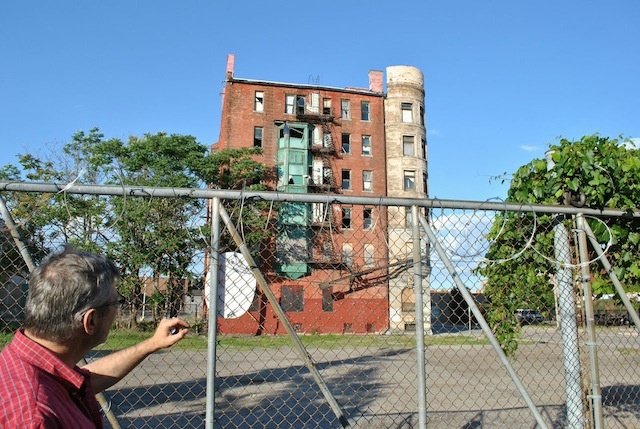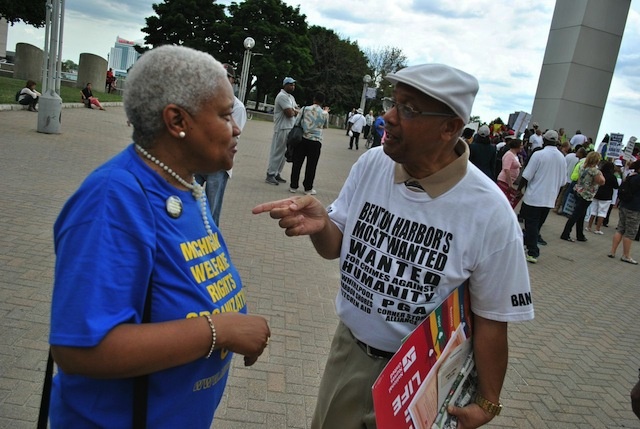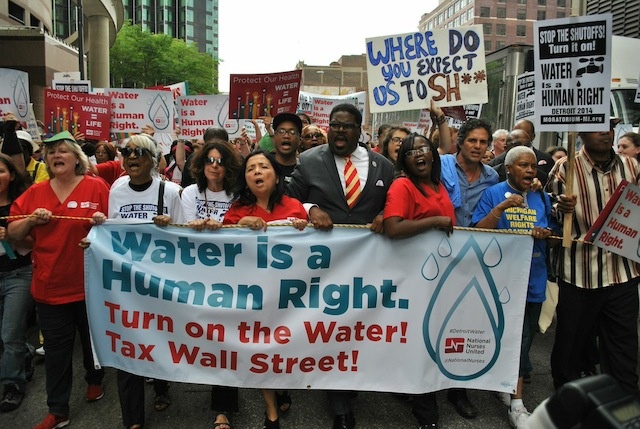
George Boukas fanned himself with a shutoff notice he'd received a few days earlier from the Detroit Water and Sewage Department. The total amount due, $340.32, was highlighted in red. “I just paid this thing,” he told me with a grin.
It was a hot, muggy Thursday afternoon at the Temple Bar on Cass Avenue near Detroit's downtown. Surrounded by atrophying homes with overgrown lawns and hollowed-out buildings, I wandered into George's place because it was the only structure with signs of life within a three-block radius. George's bulldog, Jameson, was not used to customers. He came snarling against the glass of the front door the second I put my hand on the knob. Once Jameson had been sedated with a chew toy, George, a lifelong resident of Detroit, chatted with me at the bar.
“Water used to be something you could hold off paying until you got enough cash together,” he said. “Not anymore.”

Four days earlier, on July 14,Valerie Blakely was making breakfast for her children when she looked out the window and noticed a truck parked in front of her North End home. The 55-year-old stay-at-home mom marched outside and sat down a few inches from her curb, blocking access to the underground valve that provides water to her family, including her four kids—ages five to 14.
“You can call the police, but I'm not moving,” she told the two men with the Detroit Water Collections Project. The men were employees of Homrich Wrecking, a private corporation that was handed a $5.6 million contract by Detroit's water department to shut off the taps of thousands of Detroit residents, some of whom are as little as two months behind on their bills.
Balking at Valerie's presence, the men with Homrich Wrecking simply moved on. Valerie followed their truck as it lurched down her street, shutting off water to approximately 25 homes on her block. Since then, Valerie has turned her front lawn into an emergency center, like the kind that pop up after hurricanes. She is working with local NGOs to distribute water and keeps a cauldron of stew or vegetable chili brewing at all times. “My neighbors can't cook, can't bathe. They have nothing to drink,” she said. “My neighborhood is now a disaster area.”

Welfare rights advocated Maureen Taylor chatting with another Detroit resident, on her way to bail fellow activists out of jail
Awash with empty homes, skyscrapers, and factories and saddled with nearly 15 percent unemployment, Detroit has been economically water-boarded and bled dry. Most of the city's inhabitants have fled the city in the last several decades, or else they are holding on for dear life. At the same time, the wealthy business elites have remained are buying up land for pennies a pop, creating a powerful wave of gentrification that looms over the city—that is, if it can survive its latest crisis.
Tens of thousands of people who live beside a river and the largest freshwater source in the world, the Great Lakes, can't even drink from their own faucets. As of July 1, 141,137, or 48 percent, of Detroit's residential water accounts were at least 60 days overdue—the cutoff threshold set by the Water and Sewage Department. Fifty-four percent of the city's commercial accounts and 47 percent of its industrial accounts were two or more months delinquent as well. Nearly half of Motor City is under threat of losing its water, the price of which has risen 110 percent over the last decade.
On Monday the water department announced that it was suspending the shutoffs for 15 days to allow Detroit's residents time to scrounge up cash, but damage has already been inflicted on thousands of households and the threat of losing water continues for some 300,000 citizens including children, the elderly, and the ill.
America's registered nurses declared Detroit a “public health emergency zone,” in a statement distributed to the press last week through their 180,000 member union, National Nurses United. The United Nation's High Commission on Human Rights condemned the shutoffs in June and said it would reach out to the Obama Administration to prevent further violations to people's right to water. Locally, mutual recriminations have been flying all over the place. The Water and Sewage Department has claimed some residents could pony up if they really wanted to but were simply mooching off the city.
This was a view shared by the surly cabdriver who gave me a lift into town from the airport. The city is “going to shit” he said before making the sinking sound of a bomb landing with his lips. The citizens of Detroit are, by and large, slovenly idiots—the kind of people who keep going back to the convenient store for cans of beer instead of buying the whole six-pack, he explained. The cabby had lived in the city for 35 years after immigrating from Iraq, but, he told me, these days “Detroit is worse than Baghdad.”
And certain statistics back him up. Baghdad actually has both a lower unemployment rate and a lower murder rate than Detroit.
We drove past the field where the old Tigers' stadium once stood and where rows of shabby bars that had counted on customers the team brought their way remained. I stationed myself at Corktown Inn, the kind of place most people rent by the hour. A vending machine by the front desk dispensed underwear for two dollars. There was a realtor’s sign on the front lawn, but there couldn't have been many eager buyers. It looked as if the Rapture had taken place outside, an impression eerily reinforced by a billboard on the corner of Trumbull and Michigan, put up by evangelists, that asked, “What is after death?”
While Detroit has been dying of neglect and malfeasance for decades, now it is dying of thirst.
The water shutoffs began when Detroit's unelected emergency manager, Kevyn Orr, who was appointed by Governor Rick Snyder in 2012, filed the city for Chapter Nine bankruptcy last year, in an effort to rid it of approximately $18 billion in municipal debt.
A large chunk of the city's obligations are the result of borrowing, dating back to 2005, conducted by the city's former mayor, Kwame Kilpatrick, who was convicted on federal corruption charges last year. To cover budget shortfalls, Kwame issued $3.7 billion worth of bonds in complicated interest-rate swap deals with the likes of UBS, Chase, and Bank of America. When the the stock market tanked in 2008, it sent interest rates skyrocketing. Liabilities on the loans later jumped to $15 billion, more than four times the amount originally borrowed. To pay its way out of one bond deal, the Department of Water and Sewage borrowed $300 million in 2012.
“It all ties in together,” said Vanessa Fluker, a short, matter-of-fact housing attorney who, in her 60s, could still pass for a lightweight boxer. Walking past the Chase building with me downtown, she noted that the same banks who suckered the city into interest-rate swap deals created a housing crisis through subprime loans. These were bundled and sold to investors with bullshit triple-A ratings. When homeowners couldn't make mortgage payments and were shown the curb, it sent global markets plummeting and interest rates on the city's swaps through the roof.
Automation and globalization had already been gradually shrinking the workforce of the big auto giants and the population of Detroit, which reached a height of 1.85 million people in 1950 but has now dwindled to approximately 700,000. The 2008 financial crisis, however, proved to be a knockout blow to Motor City's staple employers. Chrysler and General Motors (currently immersed in litigation surrounding faulty ignition switches that led to at least 16 deaths) filed for bankruptcy, and a fresh round of layoffs ensued. The federal government bailed out the automakers and the big banks, but Detroit and its “economically abused” citizens, as Vanessa describes them, have gotten no relief.
In April, Bank of America and UBS agreed to accept a flat $85 million from the city to cover further debt obligations tied to the swaps, a deal the judge overseeing Detroit's bankruptcy signed off on. But in order to cover the budget shortfalls caused by its dealings with Wall Street, the Water and Sewage Department is still twisting the arms of residents and businesses already feeling the pinch of the Great Recession.
“I will tell you the same thing a hundred thousand people in Detroit will tell you,” Valerie Blakely told me. “My husband lost his job at Lapeer Metal Stamping in 2008, and he's been fixing cars here and there just to get by ever since.” On top of everything else, Detroit is coming off a brutal polar-vortex winter where, Valerie said, “our utility bills literally quadrupled.” At this point she estimates she owes the city about a grand in back payments. She is not alone.
“Right now we've got about $89 million out there in delinquencies,” Greg Eno, a spokesperson for the water department told me when I reached him by phone. “That's why we've decided to ramp up our efforts.” Last August, 2,752 accounts were shut off; 3,487 in September. By June of this year the number of shutoffs had escalated to 7,210. “It's working,” said Greg. “We're getting people's attention. We've collected almost $2 million since February.”
Greg got a bit defensive when I asked about Valerie's situation and that of the thousands of other Detroit residents in the same boat as her. Who could blame him? Saying you work for the department these days in Detroit is a bit like professing that you molest children.
On July 7, he told me, the department activated a program to help low-income residents stay connected to the city's water supply, financed with about a million dollars' worth of donations collected over the years through voluntary contributions from other customers. Why hadn't the department delayed its shutdown campaign until it could ensure the Detroit's poorest could pay? Greg said the city's human-rights office was going to administer the account, “but they got lobbed off as part of the bankruptcy.” His department had to scrabble to find an outfit to administer the donations.
Now the money is being dispensed by the not-for-profit THAW, the Heating and Warmth Fund. THAW representative Jill Brunett told the Detroit Free Press last week that the donations will help about a thousand costumers, well short of the tens of thousands loosing their water. According to Jill, THAW is receiving hundreds of calls a day.
Need is great, but it's a lack of people that are causing all the trouble. Greg told me running water in vacant properties makes up a “significant” portion of the department's total costs, though he couldn't give an exact figure. Emergency Manager Kevyn Orr has publicly pondered privatizing Detroit's water supply, but in the meantime the water department is still trying to raise revenues from a draining pool of costumers.
“You can't expect 700,000 people to do what 2 million people used to do,” said Maureen Taylor, chair of the Michigan Welfare Rights Organization. “When we all had factory jobs, we all had money. Now the jobs are $7, $8, $9 dollars an hour.”
I met Maureen following a rally against the shutoffs beside the Detroit River, near the city's Municipal Center on July 18. A moxie grandmother with a quick and wry sense of humor, Maureen was on her way to bail nine activists out of jail who'd been arrested while blocking Homrich Wrecking trucks earlier that morning. She accused municipal administrators of "tricking." “A trick is a person who prostitutes themselves. These tricks are selling Detroit.”
Those who have remained in Detroit are fighting the good fight for survival. Their home town has become an exemplar of everything that is fucked-up about capitalism. Unemployment, stagnant wages, the rising cost of water, and a growing gap between rich and poor—these are problems much of the country has grappled with since the dawn of the Great Recession, but they are most acutely present in Detroit.

Detroit residents march against the water shutoffs. If you look closely you'll spy Mark Ruffalo, the Incredible Hulk, who turned up to support the protesters. Behind him a placard asks, “Where do you expect us to shit?”
The dinosaur bones of the city's industrial past are dotted with examples of big business gentrification. Greek Town, one the few neighborhoods in Detroit where street lamps actually come on when the sun goes down, is bustling with drunken broskis laughing like hyenas under the bright lights of casinos and bars. All these spots are outgrowths of Comerica Park, the new Tigers stadium built in 2000 by the Ilitch family of the Little Cesaers pizza empire. Christopher Ilitch, the company's CEO, has been touting plans to build yet another stadium a short distance away, this one for the Red Wings hockey franchise. He owns both teams, along with MotorCity Casino, and several other moneymaking attractions that shimmer downtown while the rest of the city is bathed in darkness.
Public funds totaling $284 million will go towars building the new $650 million home for the Red Wings, who already have a stadium just a few blocks away—the Joe Louis Arena, also owned by Ilitch Holdings. It's a win-win for the Ilitch family, since the $284 million will come from a pot administered by Detroit's Development Authority, based on taxes collected on downtown properties. Because Ilitch Holdings already owns many of those properties, it will essentially be reinvesting in itself when it pays taxes.
Some might question why a city that can barely keep water in its pipes and its lights on would help a land baron like Christopher Ilitch build a new arena when he already has a perfectly good one. Others are hoping to ride his coattails.
“If you went out the back of my bar and jacked off in the alley, you'd jizz on the new stadium they are building,” said George Baukas, whose bar on Cass Avenue lies alongside the site where the Ilitches plan to place their new development, which also includes a host of ancillary construction—restaurants, luxury apartments, and casinos. George plans on tearing down his dive, a building that dates back to 1858, to erect a two-story sports bar. He toughed it out through the decline of the surrounding area and is now sitting on a gold mine. But most people aren't so lucky. The Red Wings are expected to be in their new stadium by 2017, but one wonders how many Detroiters will be left to see them play.
George pointed to a six-story residence behind his place that he said was fully occupied 18 months ago. It looked as if it had been boarded up for years. “All these special-needs people who very rarely ventured out used to live there,” he said. “Some of them left their entire lives in that bitch.”
This piece was originally published on Vice.

